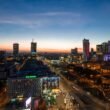You heard it too, eh? That’s right, South Korea is calling. It wants you there, now, and the country’s friendly people, rich history, captivating culture, delicious food, and exciting attractions are more than ready to welcome you with open arms.
Hopefully you’ve already got a good idea of fun things to do in Korea, or maybe a sample itinerary that can take you across numerous cities over a few days. Today, let’s discuss when’s the best time to visit South Korea.
Let’s Talk About South Korea’s Seasons
South Korea has four distinct seasons. During winter (December through February), expect dry weather and frigid temperatures hovering between single digits and the low 30s in farenheight. Snowfall is very common across South Korea during this time, so if you’re privy to ski resorts, ice sculptures, and ice skating, winter is almost the perfect time to visit South Korea.
In Spring (March to May), South Korea transforms into a haven of crisp weather and gorgeous floral displays. Temperatures will steadily climb to the 40s and stagger into the 70s by spring’s end. It’s a great time to get outside for nature escapes and to enjoy many of South Korea’s wonderful attractions.

Summer (June through August) experiences a sharp spike in temperatures, reaching into the high 80s. With the addition of increased humidity, many regions across South Korea can feel like a sweltering hot zone. Nevertheless, summer is a very popular time to visit the country and experience its wide array of attractions, from visiting historical sites and landmarks, to beautiful parks, street food markets, and outer islands.
Moreover, summer in South Korea does bring about monsoon season (June-July), which means occasional winds, high humidity, and frequent rainfall. It’s advised not to visit during this time.
Fall (September to November) in South Korea brings about pleasant temperatures, typically between 45 °F and 75 °F. The weather is much more cool and the sky a vitalizing blue, which means you’ll get some of the best sunsets of year. With cooler air and less humidity, outdoor activities become more tolerable.
So, When’s the Best Time to Visit South Korea?
The best time to visit South Korea is from April to June and September to October. Temperatures are cool/warm with less humidity, and the country experiences less tourism.

Festivals
Just in case you want to visit for a specific event, here’s a list of popular festivals in South Korea that take place throughout the year.
January – Hwacheon Sancheoneo Ice Festival
February – Jeju Fire Festival
March – Ultra Korea Music Festival
April – Yeouido Festival / Buddha’s Birthday
May – Taean Tulip Festival
June – Danoje Festival
July – Boryeong Mud Festival
August – Goesan Chili Pepper Festival
September – Wonju Dynamic Dancing Carnival
October – Busan International Film Festival
November – Seoul Lantern Festival
December – Busan Christmas Tree Festival
What’s Next?
You did it. You’ve now got a better understanding of the best time to visit South Korea. So, what time of the year do you think you’ll go? Are you up for adventures under the blistering summer sun? Or, would you rather enjoy outdoor winter activities in the snow? Maybe you’ll want to go just to experience a specific holiday or festival.
Whatever you choose, just know that there’s always time for multiple trips to make in one of the best travel destinations of East Asia, so don’t feel like it’s a one and done trip. With that, safe and happy travels!














